八年级英语下册-Unit-4-Why-don't-you-talk-to-your-parents(第1课时)教学设计-(新版)人教新目标版
八年级英语 (下)Unit4 Why don't you talk to your parents SectionB (3a-Self Check)

You should tell your brother to study with you.
《随堂10分钟》P.47-48 1.problems 2.enough 3.from 4.argue 5.what 6.finish 7.until 8.fight 9.anymore 10.advice
1 Fill in the blanks using until, so that or
although.
so that you 1. You should eat more now ________ won’t be hungry later. 2. Although ________ you may not like to do chores, you should help your parents around the house.
You could write a letter to her so that you can say you’re sorry.
2. My friend wants me to go to a party on the weekend, but I want to study for my exams next week. A: Why don’t you just go to the party? It’ll help you to relax. B: You should study for the exams because they’re more important than a party. My advice: __________________________
Unit 4 Why don’t you talk to your parents? Section B
新人教版八年级下册英语unit-4

Unit 4 Why don't you talk to your parents?一.基本知识点1。
Why don’t you talk to your parents? 你为什么不和你打父母谈谈呢?Why don’t you do sth ?= Why not do sth?为什么不..。
.。
.呢?2。
My parents don’t allow me to hang out with my friends. 我的父母不允许我和我的朋友们出去闲逛。
allow sb。
to do sth 允许某人做某事【拓展】allow v 允许allow doing sth 允许做某事They don’t allow smoking。
allow sb. to do sth 允许某人做某事My mother allows me to watch TV.be allowed to do sth 被允许做某事3。
What’s wrong? 怎么啦?【解析】What’s wrong( with sb。
/ sth) (某人/物) 怎么了?4。
look through 浏览5.work out 解决;成功地发展,后跟fine,well,badly等词,表明产生的结果如何.The teachers encourage their students to ____ the problems by themselves, and in this way students can enjoy success。
A。
give up B。
work out C. look through5。
get on with sb. 和某人和睦相处;和某人关系良好=get along withget on well/ badly with 相处的好/坏My problem is I can’t get on with my favorite. 我的问题是我不能喝我的家人和睦相处。
八年级英语下册知识讲义-重点单词(Unit 4 )-人教新目标

初中英语重点单词(下册Unit 4 Why don’t you talk to your parents?)知识梳理allow v. 允许;准许wrong adj. 错误的;不对的guess v. 猜测;估计deal n. 协议;交易relation n. 关系;联系;交往communication n. 交流;沟通argue v. 争吵;争论cloud n. 云;云朵elder adj. 年纪较长的instead adv. 代替;反而;却whatever pron. 任何;每一nervous adj. 焦虑的;担忧的offer v. 主动提出;自愿给予proper adj. 正确地;恰当地secondly adv. 第二;其次communicate v. 交流;沟通copy v. 复制;复印return v. 回来;回去member n. 成员;分子pressure n. 压力compete v. 竞争;对抗opinion n. 意见;想法;看法skill n. 技艺;技巧typical adj. 典型的football n. 足球continue v. 持续;继续存在compare v. 比较crazy adj. 不理智的;疯狂的push v. 推动;移动development n. 发展;发育;成长cause n. 造成;引起usual adj. 通常的;寻常的perhaps adv. 可能;大概;也许二、重点单词【单词学习】1. allow v. 允许;准许【用法】(1)allow sb. to do sth. 允许某人做某事(2)allow (doing)sth. 允许(做)某事(3)be allowed to do sth. 是allow sb. to do sth.的被动结构,意为:被允许做某事。
【例句】His parents don’t allow him to go out at night. 他父母不允许他晚上出去。
unit4-Why-don27t-you-talk-to-your-parents全单元知识点和练习
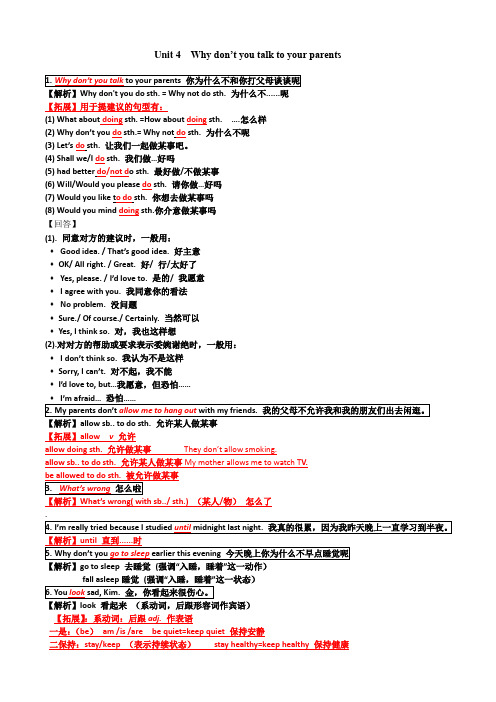
Unit 4 Why don’t you talk to your parents【解析】Why don't you do sth. = Why not do sth. 为什么不......呢【拓展】用于提建议的句型有:(1) What about doing sth. =How about doing sth. ….怎么样(2) Why don’t you do sth.= Why not do sth. 为什么不呢(3) Let’s do sth. 让我们一起做某事吧。
(4) Shall we/I do sth. 我们做…好吗(5) had better do/not d o sth. 最好做/不做某事(6) Will/Would you please do sth. 请你做…好吗(7) Would you like t o do sth. 你想去做某事吗(8) Would you mind doing sth.你介意做某事吗【回答】(1). 同意对方的建议时,一般用:◆ Goo d idea. / That’s good idea. 好主意◆OK/ All right. / Great. 好/ 行/太好了◆ Yes, please. / I’d love to. 是的/ 我愿意◆ I agree with you. 我同意你的看法◆ No problem. 没问题◆Sure./ Of course./ Certainly. 当然可以◆Yes, I think so. 对,我也这样想(2).对对方的帮助或要求表示委婉谢绝时,一般用:◆ I don’t think so. 我认为不是这样◆Sorry, I can’t. 对不起,我不能◆I’d love to, but…我愿意,但恐怕……【解析】allow sb.. to do sth. 允许某人做某事【拓展】allow v 允许allow doing sth. 允许做某事They don’t allow smoking.allow sb.. to do sth. 允许某人做某事My mother allows me to watch T V.【解析】What’s wrong( with sb../ sth.) (某人/物)怎么了【解析】go to sleep 去睡觉(强调“入睡,睡着”这一动作)这一状态)【解析】look 看起来(系动词,后跟形容词作宾语)【拓展】:系动词:后跟adj.作表语一是:(be)am /is /are be quiet=keep quiet 保持安静二保持:stay/keep (表示持续状态)stay healthy=keep healthy 保持健康三变化:become/get/turn (表示状态变化)【解析】call up (v + adv) call on 拜访;号召【解析】find sb.. doing sth. 发现某人正在做某事Mr. Wang found Li Dong reading a storybook in the class.类似动词:hear,watch, see, feel【解析】be angry with sb.. 生某人的气【拓展】angry adj.生气的→ angrily adv. 生气地(1)be angry with sb.. =be mad at sb.. 对某人生气【with后接人】(2)be angry at/about sth.对某事感到生气【at后接事】(3)be angry to do sth. 做某事感到生气10. It’s not a bi g deal. 没什么大不了;不是什么大事(常用于口语中)You left your homework at home. 你把作业忘在家里了。
八年级下册_Unit_4_Why_don't_you_talk_to_your_parents_Section_A-2
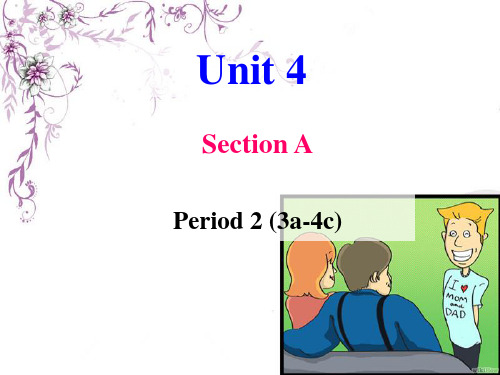
3c Which words or phrases in the letters
have the same or similar meanings as the following? Write a sentence using each word or phrase.
explain make sth. clear- _______ Can you explain to me how to do this math ______________________________________ problem? communicate talk- ___________ Family members should communicate with each ______________________________________ other so that they can understand each other ______________________________________ better. _____________________________________
I agree / disagree with his advice because …
Agree: Lack of communication is the cause of many problems. In this case, the family may truly not be aware of how the writer feels as they are too absorbed in their own problems. The parents may also be touched if the writer tries to help them by doing jobs around the house. In addition, it is not healthy for the writer to keep his negative feelings to himself. Talking is likely to help him feel better.
人教版八年级英语下册Unit 4 Why don't you talk to your parent

Unit 4 Why don't you talk to your parents?Period1 section A(1a-2d)导学案一自主学习I 基础单词1 guess_____2 deal_____3 允许;准许_____4 错误的;不对的________II 核心单词1 hang out_______2 have a fight with .____________3 give back to .________4 允许某人做某事_________5 浏览___________6 成功地发展;解决___________二合作探究重要句型1 My parents don't_____me ____ ____ ______with my friends.我父母不允许我和朋友闲逛。
2 What's ________? 怎么啦?I'm really tired because I studied______midnight last night. 我十分累因为做外我学习到很晚。
3 ______ ______ you go to sleep earlier this evening?今晚你为什么不早早睡觉呢?4 Hope things ____ ____ . 但愿情况会好起来。
三达试标测单选 1 _____help your good friend? I can't understand you.A Why not youB Why don'tC Why don't youD Why don't2 If you will know the news quickly, you may____the website quickly first.A look upB look throughC look overD look at3 You talked____at the meeting.____people might not be happy.A too much;Too muchB too much; Too manyC too many Too muchD much too ;Too many4 _______?I'm always late for school and I don't know why.A Why do you say soB Why are you doingC What's wrongD Why aren't you in school early. 四课后作业1 He didn't allow the children_______(play) in his garden.2 Did you find the little boy____(lie) on the ground when you passed by?3 I have no time_____(relax) because I have too much homework every day.4 I'm always go to bed late these days.I feel sleepy.。
人教版八年级下册英语单元复习学案:unit-4-Why-don’t-you-talk-to-your

Unit 4 Why don’t you talk to your parents?默写1 Section A 1a~2d一、默写课文中的单词。
1.允许;准许v. __________________2.有毛病;错误的adj. ____________________3.猜测;估计v. __________________4.协议;交易n. _________________________二、默写课文中的短语。
1.空闲时间_______________________2.闲逛3.课外辅导班_____________________4.和……打架___________________________5.睡觉___________________________6.给某人写信___________________________7.为了;以便于___________________8.快速查看;浏览________________________9.归还___________________________ 10.生……的气__________________________11.重要的事____________________________________________________________________12.成功地发展;解决_____________________________________________________________13.没问题;别客气_______________________________________________________________三、根据汉语提示完成下列句子。
1.为什么不和你的父母谈谈呢?______ ______ you talk to your parents?2.我的父母不允许我和我的朋友们闲逛。
My parents don’t ______ me ______ ______ ______ with my friends.3.你应该和他谈谈,以便于你可以说你很抱歉。
初中英语_Unit4 Why don’t you talk to your parents?教学设计学情分析教材分析课后反思
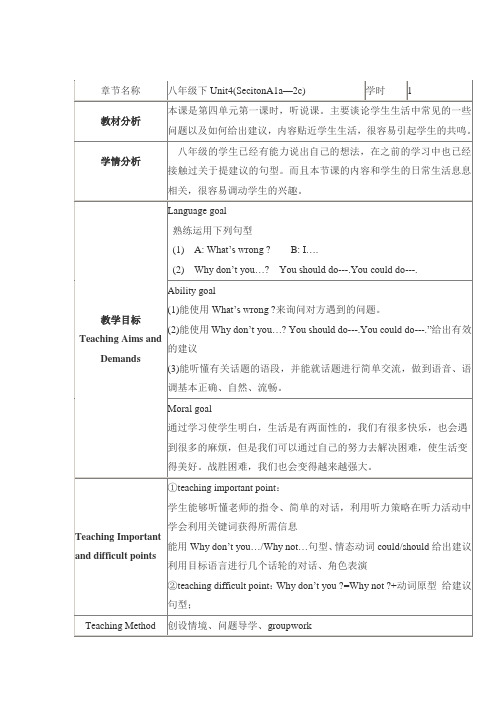
Step 5:Listening活动一、出示听力图片引导学生猜测“Is she happy? What ’s wrong with the girl?” 播放录音 并根据学生完成听力情况调整听力次数 看图片做听力猜测,读1a 句子做好听力准备,核对答案。
活动二、fill in the blanks再次听力,补全朋友给出的建议。
重视听力策略的训练 活动二的设计一方面是根据学生的水平对听力材料难度进行的调整,另一方面也是为了让学生继续感知问题与建议这一话题。
Step 6:Group work If your classmates have some troubles, can you giv e them some advice? Try to give advice in groups. 并进行总结给出建议的几种方式。
小组合作讨论问题并给出恰当的建议,利用小组的作用,调动学生的积极性。
Step 7 :pair work T : There is something wrong with me . can you give me advice?T: Now it ’s your turn. Work in pairs to makea new conversation从师生对话过渡到生生对话,进行目标语言的操练。
Step8: ListeningShow the picture lead in the listening 2a 、2b Look at the picture and guess “What ’s the matter with Peter?”Read the advice that Peter ’s friend gives himand the reason why Peter doesn ’t like theadviceDo listening and Check the answers.通过导入听前活动,做好听力准备,进行听力训练。
新目标英语八年级下册Unit4-Why-don't-you-talk-to-your-parents
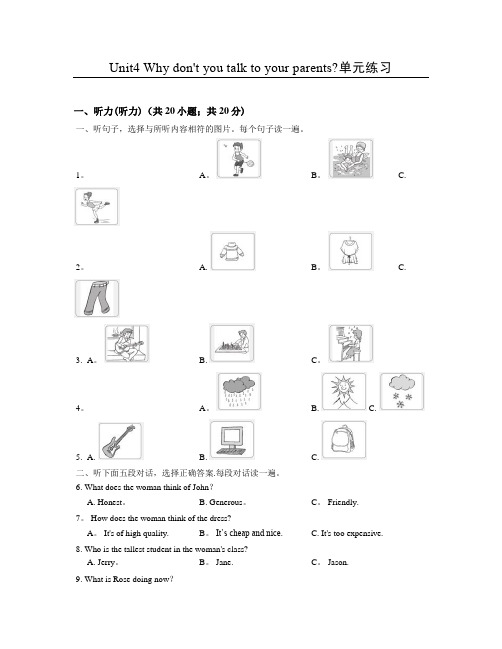
Unit4 Why don't you talk to your parents?单元练习一、听力(听力)(共20小题;共20分)一、听句子,选择与所听内容相符的图片。
每个句子读一遍。
1。
A。
B。
C. 2。
A. B。
C.3. A。
B. C。
4。
A。
B. C.5. A. B. C.二、听下面五段对话,选择正确答案.每段对话读一遍。
6. What does the woman think of John?A. Honest。
B. Generous。
C。
Friendly.7。
How does the woman think of the dress?A。
It's of high quality. B。
It’s cheap and nice. C. It's too expensive.8. Who is the tallest student in the woman's class?A. Jerry。
B。
Jane. C。
Jason.9. What is Rose doing now?A. Playing with her sisters.B. Watching a movie.C。
Doing her homework.10. Why is the woman asking for more hot water?A。
She is thirsty. B。
She hurt her feet. C。
It’s cold today.三、听下面两段对话,选择正确答案。
每段对话读两遍。
听第11段对话,回答第11至第12题。
11. What’s the matter with Lucy?A。
She speaks too much。
B。
She has a sore throat。
C. She drinks too much water.12. What should not Lucy have to do?A. Not to speak too much。
Unit4-Why-don't-you-talk-to-your-parents Section A (1a-1c)
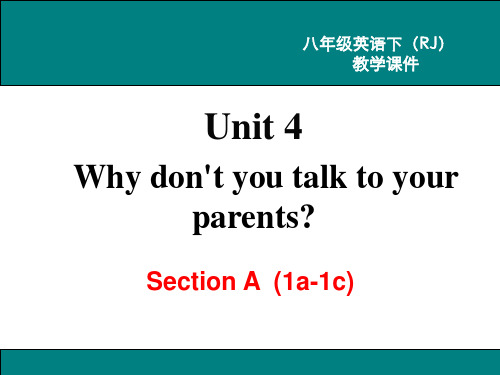
8.Today Tom has too ____ muchhomework to do.
C 1.He eats ______food, so he is ______ fat now. A. too much, too many B . too many , too much C. too much, much too D. too many , much too 2. Mary’s mother doesn’t allow her ______ to play (play) computer games. B 3._____ go for a picnic and relax ourselves. • A. Would you like B. Why not • C. What about D . Why don’t B 4. I got ____ a fight with my classmate. • A. to B. into C. at D. for
2. I have too much homework so I don’t have any free time to do things I like.
Why don’t you/Why not ask teacher for help? 3. My parents don’t allow me to hang out with my friends. Why not/ Why don’t you read some interesting books at home?
1. I have to study too much so I don’t get enough sleep. 得到足够的睡眠 2. I have too much homework so I don’t have any free time to do things I like. 有空闲时间干某事 3. My parents don’t allow me to hang out with my friends. 课外活动课 4. I have too many after-school classes. 5. I got into a fight with my best friend.
s2014春人教新目标英语八下_unit4why_don't_you_talk_to_yo

1e What is your advice for Wei Ming?
Tell your partner and say why.
A: I think Wei Ming should… B: Why? A: Because…
Talk about the problems below and ask your classmates for advice.
1d Listen again. What advice does Alice
give to Wei Ming? Fill in the blanks.
1. Although you may be ________ with your parents, you should talk to them. Ask them why they give you so much ________.
Unit 4
Why don't you talk to your parents?
Section B
Period 1 (1a-1e)
-.
New Words
member n. pressure n. compete v.
成员;分子 压力 竞争;对抗
What activities do you like to do to help lower your stress?
help lower your stress? Order them [1-8] with 1 being the most favorite thing you do to lower stress.
__________ play sports __________ hang out with friends __________ talk to parents or other family members __________ spend time alone
新人教版八年级英语下册Unit 4 Why don’t you talk to your parents 说课稿、教学设计及教后反思

Unit 4 Why don’t you talk to your parents? 说课稿一、教材分析(一)教材的地位和作用本课的中心话题是谈论同学们生活及学习中的问题和困难并提出合适的建议,从而展开教学活动。
学习本课的内容为整个单元打下基础,同时也是英语教学中拓展学生思维的重要环节。
(二)教学目标的确立和依据根据《新课程标准》的要求,为了完成正常的教学任务,有效地培养学生的自信,创新精神和合作互助的能力,我确立如下的教学目标:1、语言知识:学生能够使用以下词汇:too much, enough, allow, hang out, fight,wrong, midnight.句型:----What’s wrong?----I have to study too much so I don’t get enough sleep. ----Why don’t you talk to your parents?2、语言技能:(1)学完本课,让学生学会用英语说出学习和生活中的问题和困难,并能根据别人的问题给出合适的建议。
(2)能运用所学单词、短语及句型,结合实际生活进行灵活运用。
3、学习策略:(1)自主学习:要求学生采用自主学习的方式,能根据需要进行有目的的预习。
(2)合作学习:在活动中相互探讨,相互交流与合作,从而获得知识、技能和情感体验。
4、情感态度:(1)通过说出自己学习和生活中的问题和困难,让同学们学会释放压力,增加自信,热爱生活。
(2)通过给别人提建议,培养学生团结互助的精神,增进同学之间的感情。
5、文化意识:(1)了解中西方文化差异:我们比较委婉,而西方人则更直接一些,对学生进行不同文化意识的渗透。
(三)教学重点和难点:1.重点:让学生用英语说出学习和生活中的问题和困难,并且给出别人一些合适的建议,注意提建议的句型及用法和建议形式的多样化。
2.难点:用英语给出合适的建议是一大难点,词汇和短语搭配等基本功要扎实。
2014人教版新目标英语八年级下Unit4why_don't_you_talk_to_your_parents_section B(2a-2e)c

7. Look for differences and similarities compare between things _________ compare v. 比较 compare …with… 比较;对比 e.g. How does your new house compare with your old one? 你的新房子和旧房子比起来怎么 样?
• Two. Many of students ars are practicing sports.
The Taylors are a typical American family. Life for Cathy Taylor's three children is very busy. “On most days after school,” Cathy says, “I take one of my two boys to basketball practice and my daughter to football training. Then I have to take my other son to piano lessons. Maybe I could cut out a few of their activities, but I believe these activities are important for my children's future. I really want them to be successful.” However, the tired children don’t get home until after 7:00 p.m. They have a quick dinner,
2014年新版新目标英语八年级下Unit4_Why_don’t_you_talk_to_your_parents_Section_A3a-3c

too much homework. too many examinations can’t get good grades can’t choose subjects we like
have to get up too early have no enough money have no time to watch TV argument between parents
• (2)so …that 的否定形式可与 too…to not…enough to替换。 • He is so young that he can’t go to school. • =He is too young to go to school. • =He is not old enough to go to school.
• He worked day and night in order that he could succeed. • He worked day and night in order to succeed.
结果状语从句
• • • • • • (1) so…that,such…that so +adj\adv+that so+adj+a\an+单数名词+that Such +a\an +adj+单数名词+that Such +adj+复数名词+that Such +adj+不可数数名词+that
/Advice
You should offter to help.You could do more jobs around the house. You could sit down and communcite with your brother.
版新目标八年级下册英语unit4-why-don't-you-talk-to-your-parents重点知识讲解
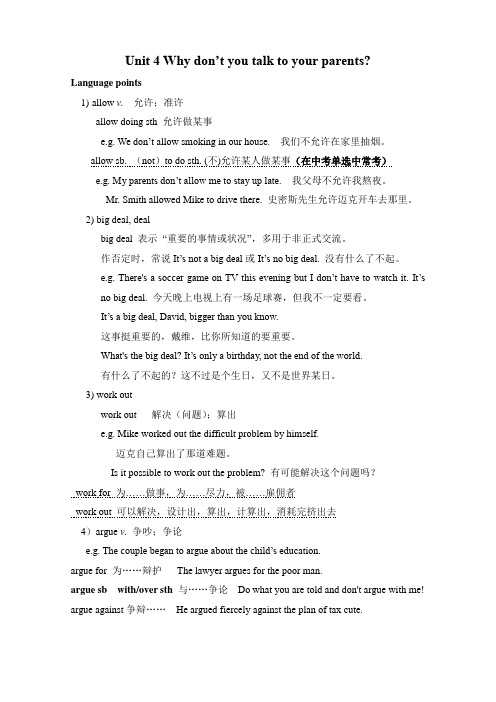
Unit 4 Why don’t you talk to your parents?Language points1)allow v. 允许;准许allow doing sth 允许做某事e.g. We don’t allow smoking in our house. 我们不允许在家里抽烟。
allow sb. (not)to do sth. (不)允许某人做某事(在中考单选中常考)e.g. My parents don’t allow me to stay up late.我父母不允许我熬夜。
Mr. Smith allowed Mike to drive there. 史密斯先生允许迈克开车去那里。
2) big deal, dealbig deal 表示“重要的事情或状况”,多用于非正式交流。
作否定时,常说It’s not a big deal或It’s no big deal.没有什么了不起。
e.g. There's a soccer game on TV this evening but I don’t have to watch it.It’sno big deal. 今天晚上电视上有一场足球赛,但我不一定要看。
It’s a big deal, David, bigger than you know.这事挺重要的,戴维,比你所知道的要重要。
What's the big deal? It’s only a birthday, not the end of the world.有什么了不起的?这不过是个生日,又不是世界某日。
3) work outwork out 解决(问题);算出e.g. Mike worked out the difficult problem by himself.迈克自己算出了那道难题。
Is it possible to work out the problem? 有可能解决这个问题吗?work for 为……做事,为……尽力,被……雇佣者work out 可以解决,设计出,算出,计算出,消耗完挤出去4)argue v. 争吵;争论e.g. The couple began to argue about the child’s ed ucation.argue for 为……辩护The lawyer argues for the poor man.argue sb with/over sth 与……争论Do what you are told and don't argue with me! argue against争辩……He argued fiercely against the plan of tax cute.5). proper adj.正确的;恰当的e.g. It’s not proper to visit a friend too late in the evening.太晚了,去看朋友不合适。
人教新目标八年级英语下册Unit4-Why-don't-you-talk-to-your-paren
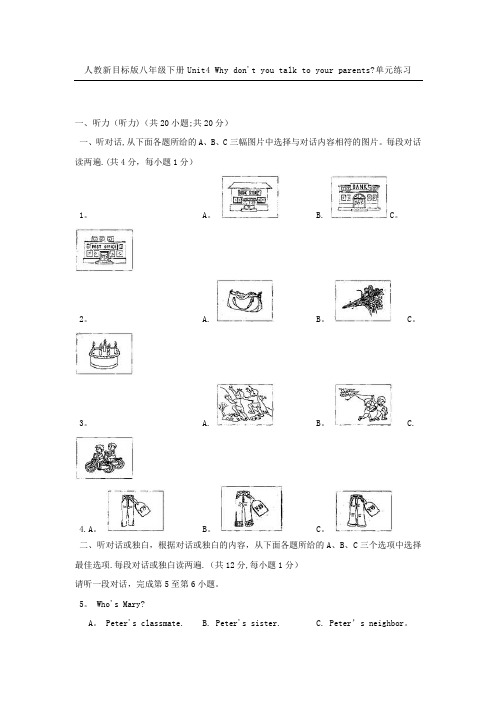
人教新目标版八年级下册Unit4 Why don't you talk to your parents?单元练习一、听力(听力)(共20小题;共20分)一、听对话,从下面各题所给的A、B、C三幅图片中选择与对话内容相符的图片。
每段对话读两遍.(共4分,每小题1分)1。
A。
B. C。
2。
A. B。
C。
3。
A. B。
C.4. A。
B。
C。
二、听对话或独白,根据对话或独白的内容,从下面各题所给的A、B、C三个选项中选择最佳选项.每段对话或独白读两遍.(共12分,每小题1分)请听一段对话,完成第5至第6小题。
5。
Who's Mary?A。
Peter's classmate. B. Peter's sister. C. Peter’s neighbor。
6. What does Mary’s brothe r teach?A. Japanese。
B. English. C。
Chinese。
请听一段对话,完成第7至第8小题。
7。
Where does the boy want to go?A. The museum.B. The cinema.C. The shop.8. What time will the boy meet his friends?A。
At 7:30。
B。
At 5:30. C。
At 3:30。
请听一段对话,完成第9至第10小题。
9. Why does the boy look unhappy?A。
He has to write a paper。
B. He has to take a history class.C。
He has to repair his computer.10。
What's the most important invention for the girl?A。
Clocks。
B。
Computers. C。
八年级英语下册Unit4Whydon’tyoutalktoyourparents-知识点整理
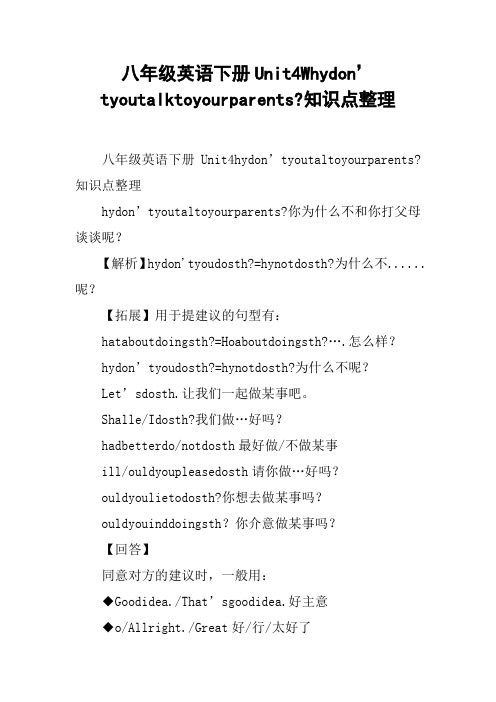
八年级英语下册Unit4Whydon’tyoutalktoyourparents?知识点整理八年级英语下册Unit4hydon’tyoutaltoyourparents?知识点整理hydon’tyoutaltoyourparents?你为什么不和你打父母谈谈呢?【解析】hydon'tyoudosth?=hynotdosth?为什么不......呢?【拓展】用于提建议的句型有:hataboutdoingsth?=Hoaboutdoingsth?….怎么样?hydon’tyoudosth?=hynotdosth?为什么不呢?Let’sdosth.让我们一起做某事吧。
Shalle/Idosth?我们做…好吗?hadbetterdo/notdosth最好做/不做某事ill/ouldyoupleasedosth请你做…好吗?ouldyoulietodosth?你想去做某事吗?ouldyouinddoingsth?你介意做某事吗?【回答】同意对方的建议时,一般用:◆Goodidea./That’sgoodidea.好主意◆o/Allright./Great好/行/太好了◆yes,please./I’dloveto是的/我愿意◆Iagreeithyou我同意你的看法◆Noproble没问题◆Sure/ofcourse/certainly当然可以◆yes,Ithinso对,我也这样想对对方的帮助或要求表示委婉谢绝时,一般用:◆Idon’tthinso我认为不是这样◆Sorry,Ican’t对不起,我不能◆I’dloveto,but…◆I’afraid…我愿意,但恐怕……【XX天津4】35.—hynotgotoLaoSheTeahousetonight?—______.A.Itdoesn'tatterB.Thanyouc.SorrytohearthatD.Soundsg reat【XX广东广州4】25.—Ifeelreallytired.—______A.Lucyyou!B.you’dbetterorharder.c.congratulations!D.hynotgoandhavea rest?【XX四川凉山3】37.—It’saniceday,isn’tit?—yes.______goinghiingandrelaxourselves?A.hynotB.hydon’tc.hatabout【XX湖南益阳】youlootootired.hynot_____arest?A.StoptohaveB.tostop havingc.stophavingIhavetostudytoouchsoIdon’tgetenoughsleep.我要学的太多,因此我睡眠不足。
- 1、下载文档前请自行甄别文档内容的完整性,平台不提供额外的编辑、内容补充、找答案等附加服务。
- 2、"仅部分预览"的文档,不可在线预览部分如存在完整性等问题,可反馈申请退款(可完整预览的文档不适用该条件!)。
- 3、如文档侵犯您的权益,请联系客服反馈,我们会尽快为您处理(人工客服工作时间:9:00-18:30)。
7.能模仿录音正确朗读和表演教材上的对话并能模仿目标语的结构和语调进行初步表达(会话)。如:
What’s wrong? I’m really tired because I studied until midnight last night .
Please read these phrases. Let’s observe the phrases: When should we use“too much”and when to use“too many”?
(学生观察总结too much和too many的用法区别,教师给予评价补充。教师板书:too much修饰不可数名词;too many修饰可数名词复数)
Then, answer:
(指着左图)What is the girl doing?(She is doing her homework.)
(指着右图)What’s this girl doing? (She is playing the piano.)
5
运用1a的描述,激活学生了解的生活中的困难和烦恼。
2.能陈述遇到的困难和麻烦。如:I have to study so much that I don’t get enough sleep.等。
3.能针对困难和麻烦提出解决的办法和建议。如:Why don’t you go to sleep earlier this evening? You could write him a letter. You should talk to him so that you
9
听前活动,了解对话谈论的内容,让学生有整体感受。
Two girls are talking about their problems. Listen and answer: What problem are they talking?
10
回答听力目标问题。
Now you’ve heard the conversation, what problem are they talking about?
2
仿照上述对话,组织Pair work复习活动。
Let’s do pair work: Talk about their problems and give some advise.
学生双人活
1 m
3
引入单元标题,导入新课话题。
Just now we talked about some physical problems. In our daily life, we usually meet many other problems. And we should solve our problems. Let’s learn“Unit 4 Why don’t you talk to your parents?”
Why don’t you talk to your parents
Unit 4
Why don’t you talk to your parents?
Period 1
Content Section A 1a, 1b, 1c; 2a, 2b, 2c,2d
教学目标要求
1.能询问别人遇到了什么困难和麻烦。如:You look sad. What’s wrong?
要求 学生举手回答问题,教师多点学生回答,不急于
给出答案。
11
通过听力呈现谈论困难和提 建议的目标语并运用
教学过程
活动
步骤
教与学活动目的及其操作
教学资源运用
复习
时间
3 m
1
复习已学目标语和导入谈论问题和提建议的话题。
Look at the picture:
— What’s the matter?
— He has a sore throat.
— He should drink hot tea with honey.
Now, let’s look at the problems in 1a. (点一位学生的名字)Read the problems, please.
学生朗读1a中描述的困难和烦恼。教师给予评价(肯定或纠正某些单词的发音。)
Now answe r me:
What’s the girl’s problem?
6
理解辨别too many和too much的用法区别。
Let’s read the sentence s together.
(教师板书:too much homework, too many classes)
Can you give more examples using“too much”and“too many”?(学生举例)
7
完成对困难和麻烦的简单评价。
Which problem do you think is serious?
Which problem do you think is not serious?
学生完成1a的表格。
8
本活动的检查评价。
Now let’s know your o pinions.
1b
时间
5 m
教师板书或课件显示:
Unit 4 Why don’t you talk to your parents?
教师询问几个学生:
What’s you r problem in your life?
1a
时间
5 m
4
读图,了解主题图——场景和人物。
Look at the picture. Please watch and read.
can say you’re sorry.等。
4.能使用情态动词could和should给别人提出建议。如:You could write him a letter. You should talk to him so that you can say you’re sorry.等。
5.能结合自身情况评价别人提出的建议。如:It’s not easy. I don’t want to talk about it on the phone等。
